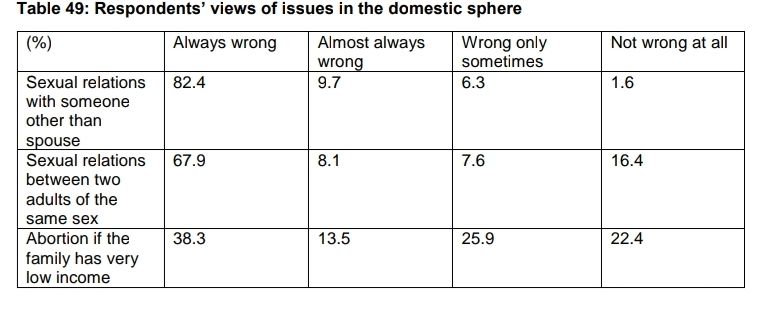Nearly 70 percent of 1,800 Singaporean residents disapprove of same-sex relationships, according to a survey carried out by the Institute of Policy Studies.
Titled "Religion in Singapore: The Private and Public Spheres", the survey asked 1,800 Singaporeans their views on issues relating to religious beliefs, religiosity and the role of religion in the private and public sphere.
Less than 16.5 per cent think there's nothing wrong
With regard to the topic of sexual relations between two adults of the same sex, the survey reported that around 68 per cent of respondents indicated that it was always wrong.
In comparison, only 16.4 per cent responded that there was nothing wrong at all.
As for the remaining correspondents, 7.6 per cent indicated that it was wrong only sometimes, while just over eight per cent said it was almost always wrong.
Here is the breakdown of responses as presented by the survey:
 Screenshot from IPS
Screenshot from IPS
Muslims, Christians and Hindus the most conservative towards same-sex relations
In breaking down the attitudes about same-sex relations by religion, the survey stated that Muslims had the most conservative attitude towards same-sex relations, followed by Christians and Hindus.
The survey added that nearly 85 per cent of Muslims, followed by 78.3 per cent of Christians and 78 per cent of Hindus saw sexual relations between two adults of the same sex as always wrong. Buddhists and Taoists stood at 63 per cent and 64.8 per cent respectively.
As for Muslims, Christians and Hindus who saw nothing wrong at all with same-sex relations, the figures stood at 5.3 per cent, 10.1 per cent and 15.4 per cent respectively.
Meanwhile, those with no religion were considered the least conservative towards same-sex relations, with 50.2 per cent responding that it was always wrong, while nearly 30 per cent said there was nothing wrong it at all.
 Screenshot from IPS
Screenshot from IPS
Buddhists/Taoists most opposed?
According to Singapore's Department of Statistics's 2016 household survey, 33.2 per cent of Singapore residents are Buddhist, 10 per cent are Taoist, 18.8 per cent are Christian or Catholic, 14 per cent are Muslim, 5 per cent are Hindu, and 18.5 per cent have no religion.
Combined, Buddhists and Taoists make up 43.2 per cent of Singapore residents in 2015, making it the largest demographic bloc.
The IPS study said that its sample "closely mirrored the general population" and there was "a good representation of a range of religions commonly practised in Singapore".
In terms of absolute numbers, Buddhists/Taoists may form the bulk of the 68 per cent of Singaporeans IPS studied who indicated that same sex relations were always wrong.
Greater acceptance of same-sex relations among younger correspondents with higher levels of education
The survey stated that younger respondents with higher levels of education were much more likely to have liberal attitudes towards same-sex relations.
By age
In breaking down the respondents by age, the survey noted that 37 per cent of respondents aged 18 to 25 found same-sex relations always wrong, compared to 85.6 per cent of respondents aged above 65.
Meanwhile, over 40 per cent of respondents aged 18 to 25 found nothing wrong with it, while only 5.3 per cent of respondents aged above 65 responded the same.
 Screenshot from IPS
Screenshot from IPS
By age and religion
The survey added that with regard to Christians and Muslims, analysing the data by both religious background and age showed a much more pronounced difference, with older respondents displaying a noticeable increase in conservatism.
For Christians, the survey stated that only 54.2 per cent of Christians aged 18 to 35 responded same-sex relations was always wrong, in contrast to 88.8 per cent of Christian respondents above 55.
As for Muslims, the survey stated that three in four Muslims aged 18 to 35 saw same-sex relations as always wrong, compared to 93.2 per cent of Muslims above 55 who responded the same way.
As such, the survey highlighted that age had a significant influence on attitudes towards same-sex relations.
Here is table showing the breakdown by both age and religion:
 Screenshot by IPS
Screenshot by IPS
By education
As for breaking down the respondents by education level, the survey noted that about 79 per cent of correspondents with a level of education at secondary school and below found same-sex relations always wrong, with slightly less than 10 per cent seeing nothing wrong.
As a point of comparison, the view of always wrong was expressed by 55.2 per cent of respondents with a bachelor’s degree and above, while almost 25 per cent of the same group saw nothing wrong.
 Screenshot from IPS
Screenshot from IPS
By education and religion
When it came to breaking down the respondents by religion and education however, the survey noted that for Muslims, Christians and Hindus, the view of same-sex relations largely remained the same in spite of educational background.
It added that more educated respondents of these three religions were still quite likely to be conservative towards same-sex relations.
With regard to Muslims, 89.2 per cent of respondents with an education level of secondary school and below saw same-sex relations as always wrong, while 75.8 per cent of Muslims with at least a degree held the same view.
For Christians, this view stood at 88.1 per cent for respondents with an education level of secondary school and below, while 74.4 per cent of Christians with at least a degree also saw same-sex relations as always wrong.
As for Hindus, these numbers stood at 86.7 per cent for respondents with an education level of secondary school and below, while 72.2 per cent of Hindus with at least a degree also held the same view.
The survey noted that while there was some decline in conservatism with education, the differences were marginal.
 Screenshot from IPS
Screenshot from IPS
Top image from Pink Dot SG Facebook
If you like what you read, follow us on Facebook, Instagram, Twitter and Telegram to get the latest updates.
